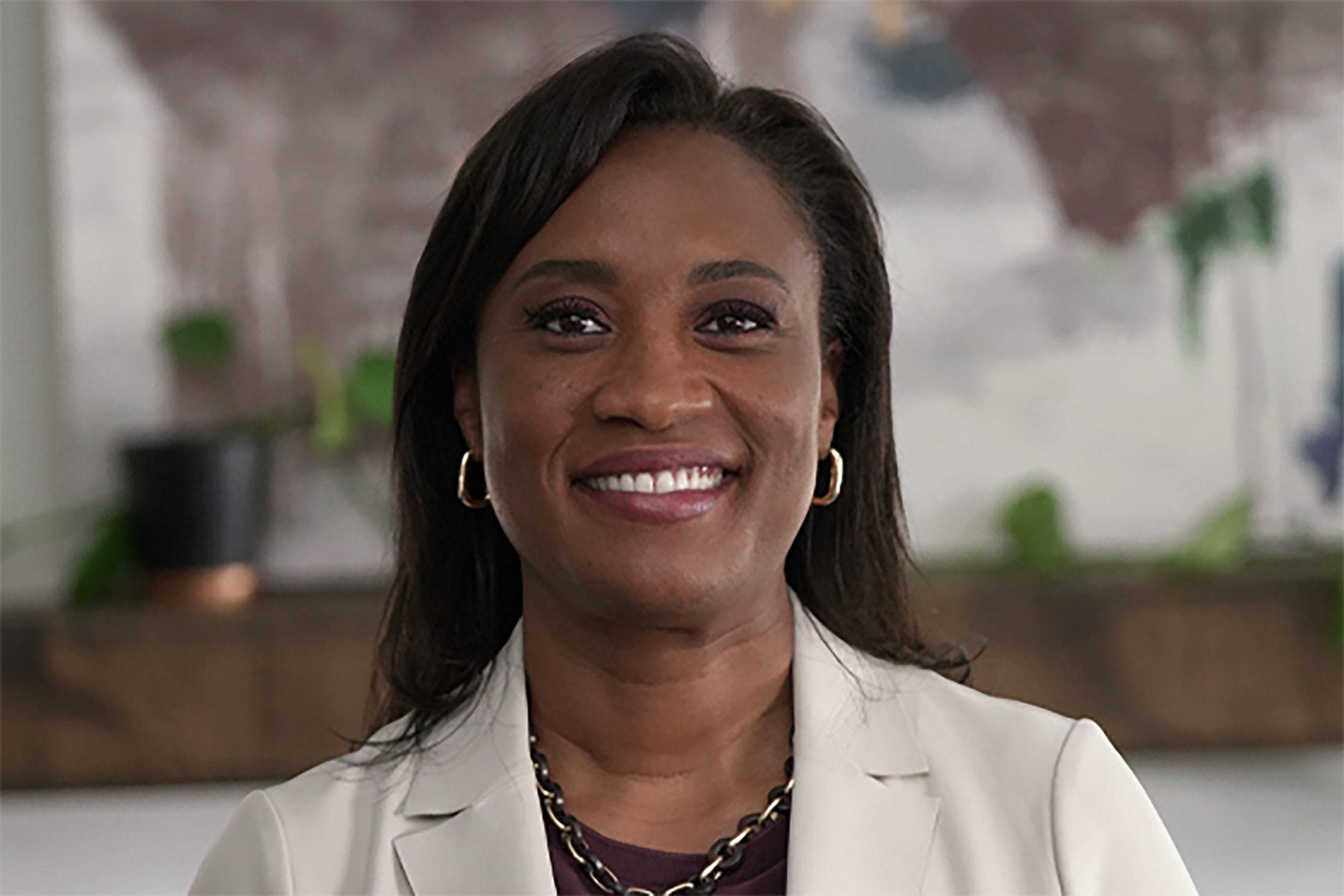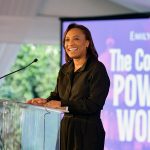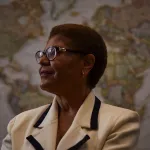Editor’s note: This article is from September 2021; read about expected interim Senate appointment here.
EMILY’s List, the powerhouse political pipeline for Democratic women candidates who support abortion rights, has tapped Laphonza Butler as its first Black president in a move that reflects the growing influence of Black women in politics.
Butler, a veteran organizer, union leader and Democratic strategist, is also the first mother to lead the group in its 36 years of existence, during which it has helped the number of women in political office grow. She was previously a senior adviser to Vice President Kamala Harris during her 2020 presidential campaign.
Butler takes the helm of EMILY’s List at a time when Black women’s political clout has expanded at the local, state and federal level and as abortion access has an uncertain future in many states, with a new ban in Texas and a case from Mississippi pending before the Supreme Court.
The organization faces a challenge in the 2022 midterms, a time when the president’s party tends to lose seats, as Democrats go into the election with fragile majorities in Congress. It also plans to work to get local leaders elected amid major battles over issues including abortion access and voting rights that are dominating Republican-led state legislatures.
In an interview with The 19th, Butler said that while expectations may be higher for her because of her race and gender, the stakes are also high for women, people of color and marginalized groups.
“For 42 years, I’ve only been a Black woman, and so I only know hard. … That’s what I do,” Butler said. “Is it harder because of my race and gender? I think of it as my superpower and, frankly, a responsibility. It is a tough political moment for sure, there is so much at stake for our country, but I want me in this fight. I want me on the front lines, because I’ve done it before. Do people have more expectations of me? Will I get all the blame if I don’t win? Probably.”
Butler was recruited by EMILY’s List in an effort driven by board chair Rebecca Haile, the first woman of color to serve in her role. The organization’s board is 50 percent people of color.
The search committee was diverse and cast a wide net, exploring more than 200 candidates, including former elected officials, political operatives, business leaders, nonprofit executives and entrepreneurs.
That EMILY’s List landed on Butler signals that the organization recognizes the future of Democratic politics and wants to continue to be part of shaping them, said veteran Democratic strategist Minyon Moore, who called Butler an “inspirational and aspirational figure” who is “the whole package.”
“She’s run big, complex organizations and she’s worked with diverse leaders, so she’s no stranger to how you organize, and that’s what electing people is all about,” Moore said. “For her, being able to concentrate on getting women elected is something that plays to her strengths. EMILY’s List is signaling that the future is browning and … the world is changing and they’re not excluding anyone.”
A video announcing her new role features Butler’s mother and her 7-year-old daughter and emphasizes diversity in political leadership in race, age and sexual orientation.
“As the first mom and first woman of color to lead EMILY’s List, my vision is for my daughter and all of America’s daughters to know that they belong anywhere, to know that they can change the game, to know that they are the face of American politics,” Butler said. “Black women, Latinx women, AAPI women, LGBTQ women, young women, older women, all women … this is where our power lies.”
The 42-year-old Mississippi native, also talked about her approach to the role through her lived experience. Butler graduated from historically Black Jackson State University — where her mother also attended but was unable to complete her studies — and later championed the rights of caregivers like her mom as a labor organizer who worked on behalf of janitors, food service workers, security officers and window cleaners.
At 30, Butler became one of the youngest leaders of the country’s largest home care workers’ union and the biggest union in California, SEIU Local 2015, where she pushed for pay equity and fought to raise the state minimum wage to $15 an hour.
Glynda Carr, of the Black women’s leadership group Higher Heights for America said the search process for a successor to Stephanie Schriock — who presided over EMILY’s list for 11 years, during a period of tremendous and historic gains for women in politics — demonstrated “an interest in reflecting the growing diversity of the country,” noting that a number of women of color had applied amid a strong pool of applicants.
“She lives and works in the spirit of Shirley Chisholm and leads in that very unbought and unbossed tradition, with an ability to build a coalition of organizations and stakeholders that will continue to strengthen EMILY’s List in this next phase,” Carr said of Butler. “In the same way we need to create the environment for Black women elected officials to lead boldly, we need to create the same environment for Black women to lead institutions like EMILY’s List.”
In a statement, Planned Parenthood’s president, Alexis McGill Johnson, said she was “excited to fight alongside” Butler at a critical juncture for abortion rights, which Butler predicted will be “a winning issue” for EMILY’s List candidates in 2022 and beyond.
“At the top of my mind is winning elections and ensuring that Democratic, pro-choice women are at the table,” Butler said, adding that voting rights could similarly galvanize women and voters of color.
She said organizations like EMILY’s List “don’t have the luxury of choosing” between victory at the federal and state level.
“We have to maintain and grow Democratic majorities in Congress, in the House and in the Senate, and we have to win governor’s mansions and the state capitols, because that’s where some of the most harmful legislation to rollback the rights of everyday people in this country are taking place,” Butler said.
EMILY’s List could not say whether there has been an uptick in fundraising or women wanting to run for office in the wake of the Texas abortion ban. Butler said she “would not be surprised” if either was the case, but did not say whether or how she planned to incorporate the issue into recruiting or raising money.
“For me, success is about the quality of life that we are creating in winning these elections, the decisions that (our candidates) will make once they get there to improve lives and communities,” she said.







